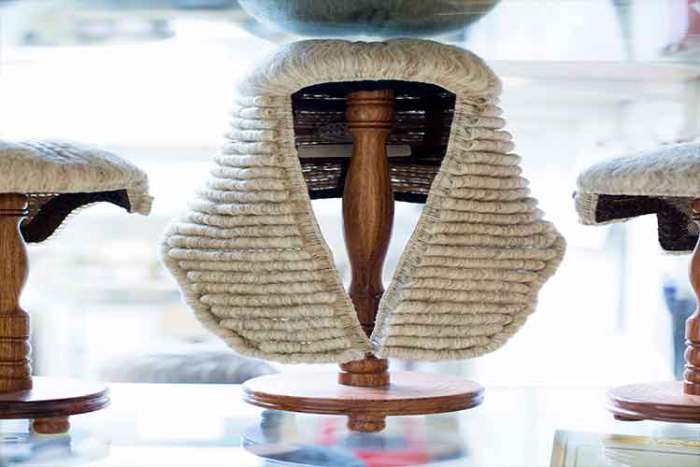
August 3, 2017
/
By:
ofcounsel_admin/
- 0 Comments
/
- Law News, Nigeria News
Some Senior Advocates of Nigeria (SANs) yesterday threw their weight behind the Attorney General of the Federation (AGF) and Minister of Justice, Abubakar Malami (SAN), over move to assert his constitutional power over the Economic and Financial Crimes Commission (EFCC), as it relates to prosecution of corruption cases.
The senior lawyers, however, stated that the rivalry between the AGF and acting chairman of EFCC, Ibrahim Magu, is endangering the graft war.
The silks, Chief Mike Ozhekome, Chief Niyi Akintola, Chief Gani Adetola-Kazeem and Mr. Seyi Sowemimo, Ahmed Raji, and Yusuf Ali bared their minds in separate interviews with New Telegraph over allegations by the AGF that the EFCC is breaching the rules in its prosecution of high profile cases.
However, the senior lawyers, in their submissions, noted that such rivalry between the AGF and EFCC is needless because the roles of each individual concerned are well spelt out in the Constitution.
According to them, the EFCC is constitutionally under the office of the AGF and, as such, the anti-graft agency must carry the AGF along in all its activities.
Speaking on the issue, Mike Ozekhome (SAN) said the EFCC must first amend the Constitution to enable it usurp and appropriate the powers of the AGF clearly spelt out in in Section 174 of the Constitution.
He said: “I am not surprised that the EFCC has scornfully and disdainfully refused to forward to the AGF the outcome of investigations of high profile corruption cases with the recommendations thereon.
“The EFCC has since become an island to itself, no doubt, a country within a country. Like the Papacy, which is recognised by the UNO, is a nation within Italy, another nation.
“It has since behaved, acted and lived above the laws of the land, contrary to its motto: “No one is above the Law”. Like witches and wizards, whose activities are shrouded in eerie secrecy in coves, the EFCC has carried on without accounting and answering to anyone.
“To continue to defy the AGF, the EFCC must first amend the 1999 Constitution to enable it usurp and appropriate the powers of the AGF clearly spelt out in section 174 of the 1999 Constitution. This section donates to the AGF, absolute powers to institute, take over or discontinue any criminal proceedings in Nigeria, subject to certain constitutional imperatives, which do not, however, concern the EFCC.
“The EFCC, in an unholy alliance with the power drunk, dictatorial and unpretentious PACAC (Presidential Advisory Council Against Corruption), has since usurped the powers of the AGF under the Constitution.
“The EFCC is, therefore, not only breaching Section 10 of the EFCC Regulations, 2010, but is actually subverting the Nigerian Constitution in a most flagrant manner. This is impunity in its naked form and crass constitutional aberration, both of which signpost the worst forms of corruption.”
On his part, Akintola noted that the AGF, being the chief law officer of the country, is empowered constitutionally to control the activities of the EFCC.
“All I know is that the EFCC is a parastatal under the office of the AGF. The AGF is the number one law officer of the country and he can decide to discontinue any case, including cases being handled by the EFCC. He can also initiate and, at the same time, take over the prosecution of cases.
“As far as the prosecution of cases in Nigeria is concerned, the buck stops at the table of the AGF.”
To Adetola-Kazeem (SAN), nothing much can be achieved in the fight against corruption if the AGF and the EFCC are working at cross-purposes.
He said: “Well, I think there must be synergy in government. The EFCC is an extension of the Executive while the Chief Law Officer of the country is the AGF.
“Even though the law allows the EFCC to investigate and prosecute corruption cases, but then, the capacity to prosecute the executive is another thing. From what we have seen from the cases being prosecuted by the EFCC, there are instances of non-diligent prosecution on the part of some counsel retained by the EFCC over some cases and it seems the capacity to prosecute effectively is not there.
“Therefore, I think there is a need for synergy between the office of the AGF and the EFCC in the graft war.”
Another SAN, Sowemimo, was of the view that lack of trust might be responsible for the dispute.
“Ordinarily, there should be no dispute because under the Constitution, the AGF is the Chief Law Officer of the Federation. He can initiate and terminate proceedings as he likes. He is only guided by public interests.
“The only reason I believe the EFCC is craving this independence is because it did not trust the office of the Attorney General to be fully engaged in the anti-corruption war. Otherwise, I don’t think there should be quarrel as to who is doing what.
“Past experiences had shown that Attorney-Generals have hindered the progress of the EFCC. But, in terms of constitutional arrangement, the EFCC cannot be above the AGF.
“This lack of synergy is one of the reasons why the graft war is failing because we are having a divided house. The EFCC is not working in tandem with the AGF’s office,” he said.
In his own reaction, Raji noted that “the AGF is the Chief Law Officer of the Federation. He superintends all the criminal prosecution, whether, EFCC, ICPC or Police, they are subject to his directives.
“But I think being functionaries of one and the same government, cooperation and better synergy should be promoted”.
For Ali, he stated that it is good thing that the AGF is trying to assert his office. Ali said: “I think it is necessary because under the constitution, the AGF has enormous powers. He is ‘primu inta priores’ among other ministers. That is the only ministry that is created by the constitution with the specification of the qualification of who should hold the office.
“So, it is a very powerful office, but there have been serious erosions of that office by recent happenings. I think the AGF should be commended for trying to take his proper mandate.”
Chairman, Presidential Advisory Committee Against Corruption (PACAC), Prof. Itse Sagay, said the power of the AGF is not in dispute. He stated that what is needed is the cooperation.
Sagay said: “I know that at the end of it, the authorities would call them together and reconcile them. Nobody can deny that the AGF is the directing officer for all prosecutions and his office needs to be respected.
“On the other hand, the EFCC is well equipped to arrest and prosecute by itself, at times it wants to conclude cases that it has started and not have any other agency handle it. So these are the things they need to sort out. I just think it’s really a situation where one respects the other and allow it do jobs it has the capacity.”
The Nigeria Lawyer

